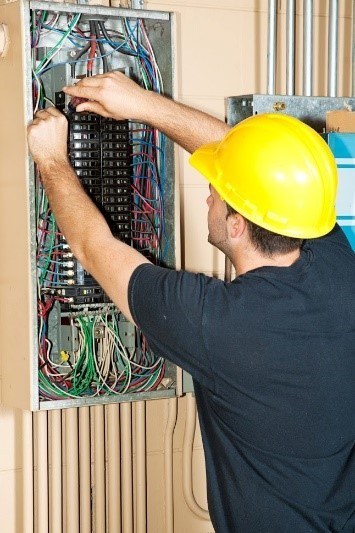News & Events
July 1, 2021
What to Expect From an Electrician Apprenticeship

If you have decided to pursue a career as an electrician, you will often need to complete an electrician apprenticeship first. An apprenticeship takes approximately four years to complete on average, so get a thorough understanding of what an apprenticeship involves before you invest the time and money. Use this overview of what you should expect during an electrician apprenticeship.
Electrician Courses
Like any occupation where advanced technical knowledge is necessary, you will often need to complete courses in the classroom during your apprenticeship. The amount of time in the classroom will vary by state, as state licensing boards define their own requirements for the number of classroom hours you must complete.
Many apprenticeships only require a high school diploma or equivalent to apply, so the courses you take during your apprenticeship will start with the basics that you will need on the job. Examples of topics you will study include the basics of electrical tools, conduit work, and grounding and wiring. Your classes may be at a community college or trade school, or a private employer may provide them.
On-the-Job Training
Classroom study is essential, but theory only goes so far for developing the skills you will need as an electrician. To ensure you are prepared for the most common jobs when you become a journeyman, you will participate in on-the-job training during your apprenticeship. You will be under the supervision of a master electrician while you visit homes and businesses that need electrical work.
Electrical apprentices are expected to make some mistakes and fail to follow best practices when they begin training, so do not be stressed about this possibility during your training. The electrician who oversees your work will educate you about common pitfalls like using less wire than is necessary or failing to run a circuit through all parts of the home where it is needed.
Another key skill that electricians must pick up during training is time management. Electrical work is unique in that the system must be in a working state when you leave the job site. The electrician you work with will help to ensure that the job is complete and everything is reassembled before you leave for the day.
Journeyman Exam
After your apprenticeship is complete, you will have the title of journeyman electrician. First, however, you must pass the journeyman electrician exam at the end of your program. Journeyman exams are conducted periodically throughout the year, and your program will inform you of the dates and locations for your exam at the end of your apprenticeship.
To be better prepared for your exam, find practice journeyman exams online before your test date. Topics commonly covered include electrical theory, voltage and wattage calculations, wiring methods in frequently encountered situations, and details about specific electrical devices, motors, and generators. In most cases, you will receive notification about the results of your exam immediately upon completion.
Continuing Education
Even after you have completed your apprenticeship, your classroom days are likely not over. Many state licensures require their electricians to attend ongoing education to keep their licenses current and stay familiar with the latest technology and trends. These classes will be necessary to renew your license periodically, according to the rules set by your state board.
Electrician apprenticeship is a valuable program that provides a gateway to a fulfilling and high-paying career. If you are interested in becoming a master electrician, Independent Electrical Contractors of Greater Cincinnati can help you take your first step toward the career you have always wanted! Get in touch today to learn more about our apprenticeship program and training opportunities.